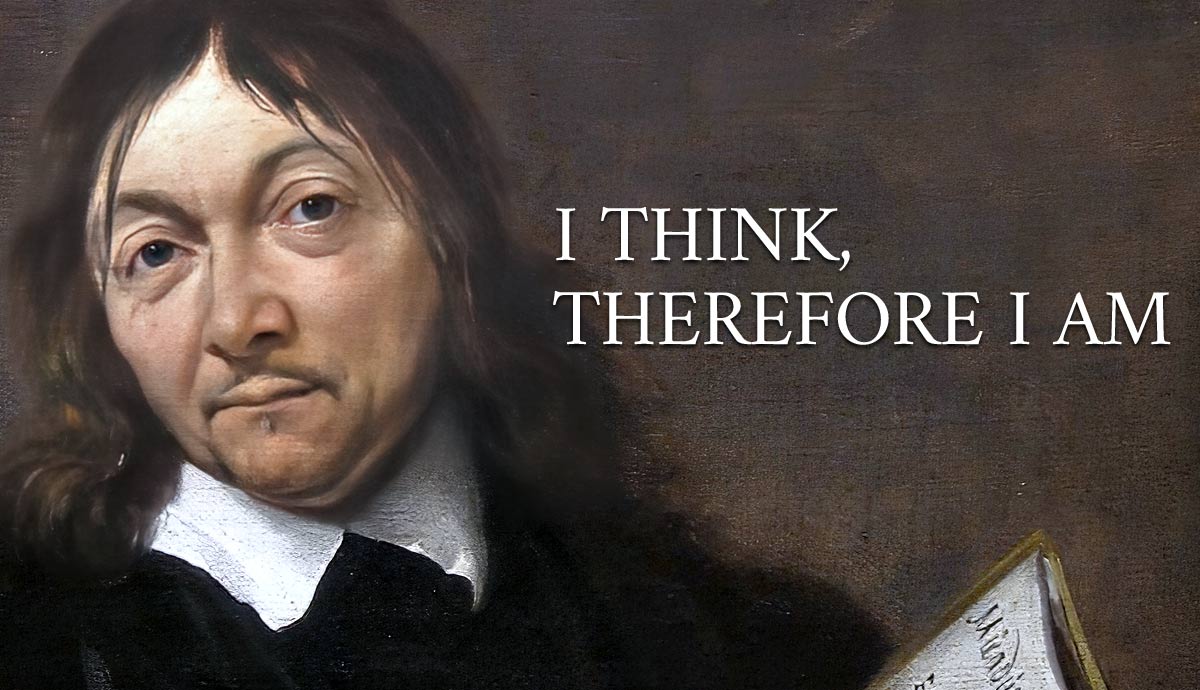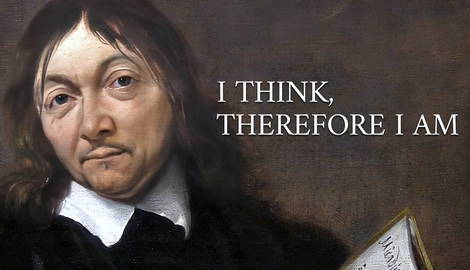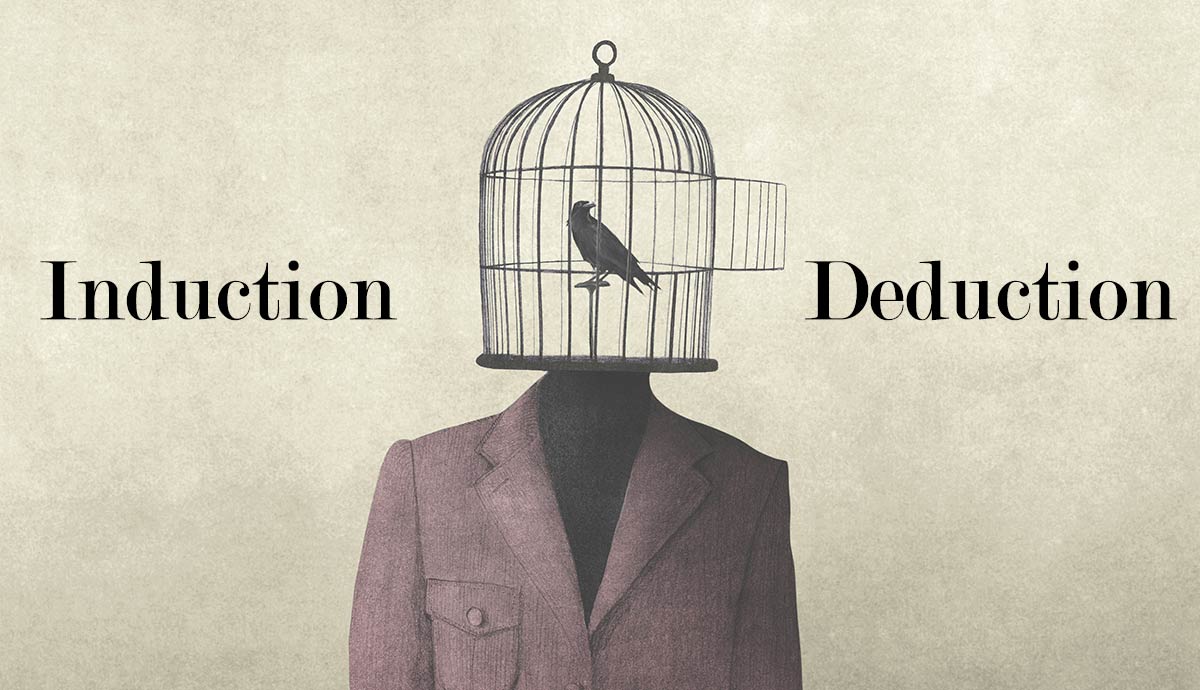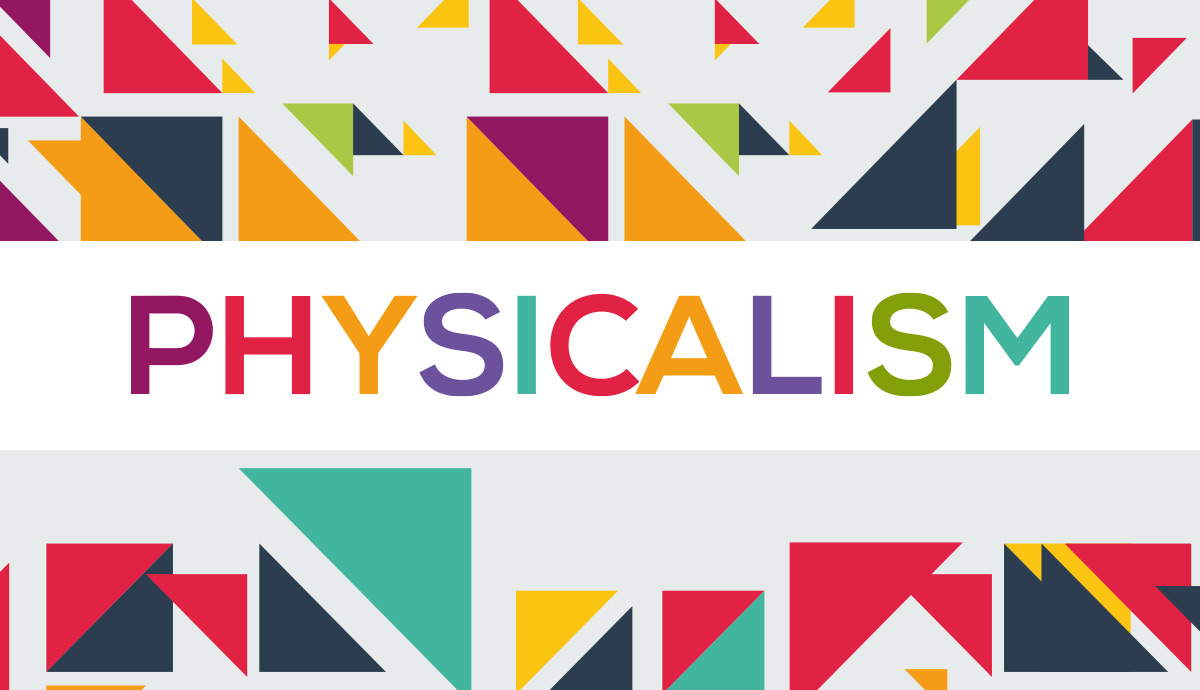
René Descartes helped reset how we ask what can be known. In Discourse on the Method, Meditations, and Principles of Philosophy, he tests every belief with methodical doubt and rebuilds knowledge from what cannot be denied.
Here we unpack five of his most quoted lines. We explain what each one means, where it appears, and why it still matters.
1. “Cogito, ergo sum” (I think, therefore I am)

Descartes’ famous phrase, “Cogito, ergo sum,” or “I think, therefore I am,” is at the heart of his philosophy. It was intended to provide Descartes with a starting point for establishing certain knowledge.
By doubting everything—including his own existence and the existence of the external world—Descartes realizes that he cannot doubt his own doubting. The very act of doubting requires some thinking entity, which he identifies as “I.”
In saying, “I think, therefore I am,” Descartes argued that thinking and existing are one and the same thing. The method of radical doubt and the conclusion that “the thinking self” exists have far-reaching implications: they affirm the primacy of mind (or consciousness) and rationality in understanding reality.
To illustrate, imagine someone sitting alone in a room pondering whether anything they see or experience is real or just an illusion. However, as they are still engaged with these thoughts, their actions show that they exist as thinking beings—regardless of whether what’s outside their mind is real or illusory, even if it is all an illusion created by some evil demon.
Descartes’ phrase raises issues about who we are as human beings and how our minds relate to our bodies. It implies that perhaps our minds or consciousness can be separated from our physical bodies. This philosophical position is called Cartesian dualism.
2. “Divide each difficulty into as many parts as is feasible and necessary to resolve it”

René Descartes propounds a pragmatic and methodical approach to problem-solving. If complex problems are broken down into simpler, more understandable parts, he suggests, then clarity and solutions can be reached.
Suppose you aim to design a better smartphone. Break your task down into its components: you have hardware, software, user experience, and market competition. Thinking about it this way helps you address each constituent part and improve your understanding of the challenges and opportunities presented, rather than being overwhelmed by complexity from the outset.
Descartes advises us to break down our problems so that we can examine them both thoroughly and systematically. When taken apart, they become easier to understand and solve.
3. “The reading of all good books is like a conversation with the finest minds of past centuries”

Because Descartes believed that reading good books is like having a conversation with the greatest minds of the past.
When you read those sorts of books, you expose yourself to many different ways of thinking. You see things through other people’s eyes and learn how they think. Doing this can help us develop our critical thinking skills and challenge our own beliefs—even if it is just while we are sitting on a train or bus reading a book.
We can do this when we pick up one of his works, such as Meditations on First Philosophy. When Descartes wrote this philosophical treatise in 1641-42, one aim was for readers to engage directly with him by reflecting on his arguments about doubt. Reading certain works by other influential individuals also allows us to engage in similar conversations with some truly brilliant people who have been dead for centuries.
Take Plato’s The Republic (c. 380 BCE). By engaging with it through the dialogues between Socrates and others, readers have the opportunity not only to converse intellectually but also to explore ideas about justice or consider what an ideal society would look like.
4. “It is not enough to have a good mind; the main thing is to use it well”

Renowned as the father of modern philosophy, Descartes espoused reason as the bedrock of knowledge. He contended that an individual could employ their reason to arrive at certainties by means of his celebrated method of doubt.
In this quote, Descartes urges individuals not just to possess intelligence but also to put their minds in gear through critical thinking and reasoning. The phrase “having a good mind” suggests having intellectual abilities, understanding, and knowledge. But in Descartes’ view, these are only valuable if properly used.
Imagine someone with a brilliant mind who can grasp complex ideas. However, if they do not utilize it—if they do not address problems or contribute meaningfully in discussions—their intelligence remains untapped. By contrast, another person might be less naturally gifted but consistently exerts themself on using whatever mental apparatus they possess well.
Descartes’ philosophy stresses the active use of reason and critical thinking. Merely “having a good mind” is not enough; you must also harness it through critical reasoning.
5. “If you would be a real seeker after truth, it is necessary that at least once in your life you doubt, as far as possible, all things”

Central to Descartes’ philosophy was skepticism. He famously introduced “methodical doubt,” where he questioned everything he believed or knew previously and sought a secure foundation for truth. By stripping away all assumptions and preconceptions, Descartes believed individuals could arrive at indubitable truths, ones beyond any possibility of doubt.
Descartes illustrated his point with an example: his famous thought experiment, known as the Evil Demon Hypothesis. This involved entertaining the idea that there could be an all-powerful being who systematically deceives us about everything we believe or take for granted—even basic perceptions of the world around us. By jolting people out of complacency and encouraging them to question how certain they can really be about anything, it opens up space for critical thinking and self-examination.
Engaging in this sort of systematic doubting allows us to pick through our ideas, theories, and beliefs, separating the wheat from the chaff; finding what is true among what is false, and identifying what is certain amid uncertainty. Doubt serves progress by opening minds up to fresh possibilities—new perspectives on old problems or questions.
For instance, imagine someone raised in a deeply religious family who starts questioning their inherited beliefs. By subjecting those convictions to methodical doubt, they might critically interrogate those beliefs: are they warranted? How do my views measure up against alternative interpretations or evidence? This kind of process, advocated by Descartes, might eventually lead them to a greater understanding of what they believe or a new way of thinking altogether.
In short, Descartes’ quote is about intellectual honesty. It is about having the courage to interrogate the beliefs we hold dearly if we genuinely seek truth.
So, What Does René Descartes Teach Us?

In our quest for knowledge and truth, René Descartes shows us the importance of critical thinking and rationality. Methodical doubt tells us that we need a solid foundation for our knowledge, one that is free from the vagaries of sense perception or imagination.
Further, engaging with great thinkers from the past can transform you intellectually. Read them; talk to them as though they were still alive, he says. This suggests that intellectual growth is not solely determined by one’s innate abilities; rather, it is about what one does with their mind. Nor is just having a good mind enough: we must use it well, too, through careful analysis, reasoning, and critical thinking.










